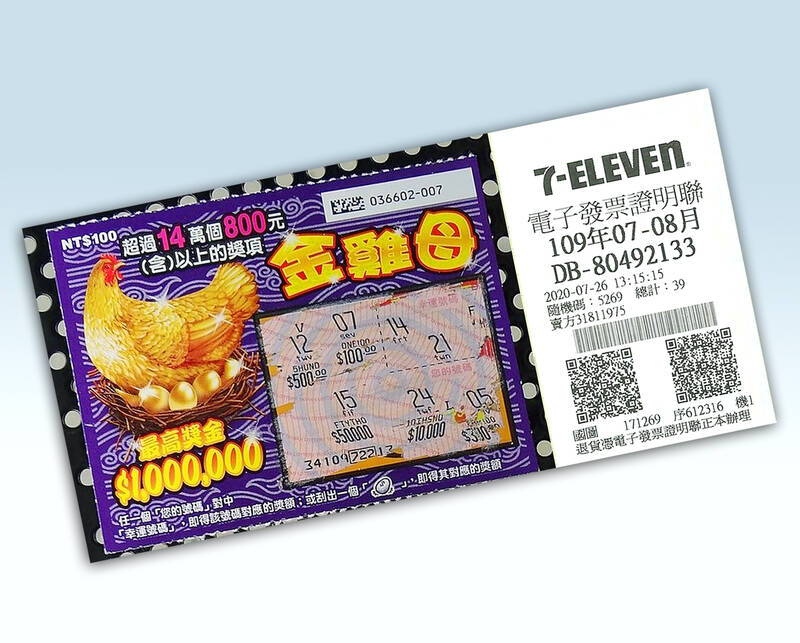清清:樂透昨天開獎,你中了嗎?
Qīngqing: Lètòu zuótiān kāijiǎng, nǐ zhòngle ma?
華華:如果中了,我今天就不會來上班了。你呢?

PHOTO COURTESY OF WIKIMEDIA COMMONS / 照片:維基共享資源提供
Huáhua: Rúguǒ zhòngle, wǒ jīntiān jiù búhuì lái shàngbānle. Nǐ ne?
清清:也都槓龜啦!不過,我的刮刮樂中了兩千塊呢!
Qīngqing: Yě dōu gàngguī la!búguò, wǒ de guāguālè zhòng le liǎngqiānkuài ne!
華華:很不錯啊!可拿到兩千,不用被扣百分之二十的稅。
Huáhua: Hěn búcuò a! Kě ná dào liǎngqiān, búyòng bèi kòu bǎifēnzhī èrshí de shuì.
清清:要是能中大獎,我寧願被扣稅,哈哈哈!
Qīngqing: Yàoshì néng zhòng dàjiǎng, wǒ níngyuàn bèi kòushuì, hāhāhā!
華華:這個月統一發票也開獎,祝你好運!
Huáhua: Zhège yuè Tǒngyī fàpiào yě kāijiǎng, zhù nǐ hǎoyùn!
翻譯 Translation
Qingqing: The lottery was drawn yesterday. Did you win?
Huahua: If I had won, I wouldn’t have come to work today. How about you?
Qingqing: Me neither, but I won NT$2,000 from a scratch-off lottery ticket!
Huahua: Congratulations! You get to keep the full NT$2,000 without having to pay 20% tax.
Qingqing: If I were to win the big prize, I wouldn’t mind the tax deduction. Hahaha!
Huahua: The Uniform Invoice lottery will also be drawn this month. Good luck!
生詞 Vocabulary
1. 開獎 (kāijiǎng) lottery draw
2. 槓龜 (gàngguī) fail to win the lottery
3. 刮刮樂 (guāguālè) scratch-off lottery ticket (Taiwan)
4. 扣 (kòu) to deduct
5. 百分之 (bǎifēnzhī) percent, percentage
6. 稅 (shuì) tax
7. 寧願 (níngyuàn) rather than, would rather
8. 統一發票 (Tǒngyī fàpiào) Uniform Invoice
教材音檔 Audio Files
國立清華大學華語中心提供
By National Tsing Hua University Chinese Language Center:

Bilingual Story is a fictionalized account. 雙語故事部分內容純屬虛構。 Emma had reviewed 41 resumes that morning. While the ATS screened out 288 unqualified, she screened for AI slop. She could spot it a mile away. She muttered AI buzzwords like curses under her breath. “Team player.” “Results-driven.” “Stakeholder alignment.” “Leveraging core competencies.” Each resume reeked of AI modeling: a cemetery of cliches, tombstones of personality. AI wasn’t just changing hiring. It was draining the humanity from it. Then she found it: a plain PDF cover letter. No template. No design flourishes. The first line read: “I once tried to automate my

Every May 1, Hawaii comes alive with Lei Day, a festival celebrating the rich culture and spirit of the islands. Initiated in 1927 by the poet Don Blanding, Lei Day began as a tribute to the Hawaiian custom of making and wearing leis. The idea was quickly adopted and officially recognized as a holiday in 1929, and leis have since become a symbol of local pride and cultural preservation. In Hawaiian culture, leis are more than decorative garlands made from flowers, shells or feathers. For Hawaiians, giving a lei is as natural as saying “aloha.” It shows love and

A: Hard rock band Guns N’ Roses and pop diva Lady Gaga are finally touring Asia again. B: Are they also coming to Taiwan? A: The band will stage a show at the Taoyuan Sunlight Arena on Saturday. B: Wow, so this will be the band’s third visit. I really love its 1992 power ballad “November Rain.” The nine-minute hit was the Billboard chart’s longest song at one point. A: Let’s go celebrate the 40th anniversary of its release. A: 硬式搖滾天團槍與玫瑰、女神卡卡終於再度展開亞洲巡演了。 B: 他們也會來台巡演嗎? A: 槍與玫瑰本週六即將在桃園陽光劇場開唱唷。 B: 哇這將是該團第三次來台演出,我超愛他們1992年強力情歌《November Rain》,全長近9分鐘還曾是告示牌排行榜最長神曲。 A: 那我們一起去慶祝該團出道40週年吧! (By Eddy Chang, Taipei Times/台北時報張迪)

A: Hard rock band Guns N’ Roses is touring Taiwan tomorrow. What about pop diva Lady Gaga? B: Unfortunately, Singapore has once again exclusively secured Gaga’s concerts in Asia, just like Taylor Swift’s exclusive Asian shows last year. A: The Singaporean government reportedly paid up to US$2.2 million to secure Swift’s shows. B: And the shows did boost its economy and tourism. A: But I’m angry about this approach, so I’m not going to Gaga’s shows this time. A: 硬式搖滾天團槍與玫瑰明天即將來台,流行天后女神卡卡呢? B: 真可惜,新加坡再度取得卡卡亞洲巡演的獨家主辦權,就像去年泰勒絲的亞洲獨家演出一樣。 A: 據報導新加坡政府付出高達220萬美元,取得泰勒絲的亞洲獨家主辦權。 B: 而她的秀也的確提振了該國的經濟和旅遊業。 A: 但我對此還是很不爽,所以不去新加坡看卡卡了! (By Eddy Chang, Taipei Times/台北時報張迪)